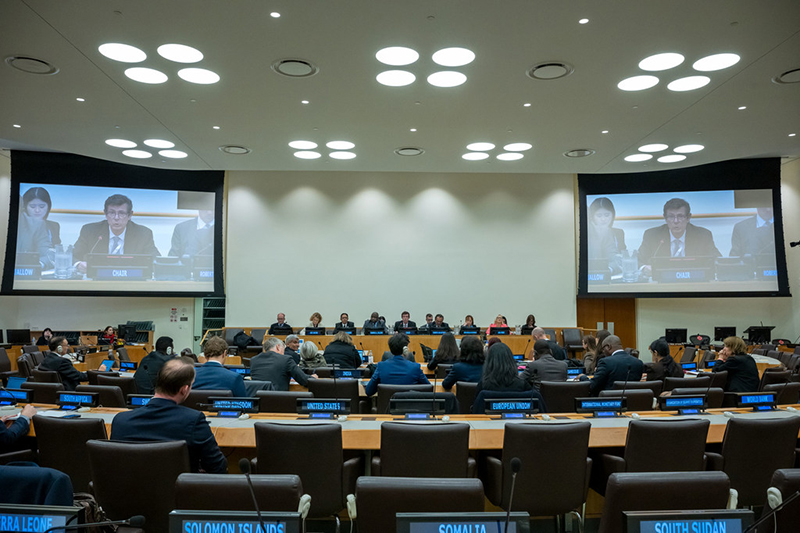 UN Peacekeepers
UN Peacekeepers
Transitional justice hinges on ‘equal footing’, say UN peacebuilders
Lasting peace hinges on everyone being on an “equal footing” and an all-of-society approach, a top UN official on Friday told the UN Peacebuilding Commission as it met to discuss national report cards on the pace of transitional justice reforms.
“A society can only succeed on its path towards sustainable peace and development when all its constituencies can participate on an equal footing,” Ilze Brands Kehris, Assistant Secretary-General for Human Rights, said ahead of progress reports delivered by high-level representatives of Colombia, The Gambia, and Timor-Leste.
The preventive potential of transitional justice can only be fully leveraged if victims are fully engaged and involved, she said at the meeting.
“States should proactively seek the active participation of victims and civil society from the outset,” she said. “In addition, broad, inclusive and meaningful public consultations are a key component – and pre-condition – to successful transitional justice processes.”
‘Equal’ justice for all
Commission Chair Ivan Šimonović, of Croatia, shared his first-hand experience in being heavily involved in post-conflict transitional justice, while serving as a high level politician at home.
“Victims need to be recognized and perpetrators need to be brought to justice, respect for human rights, rule of law, trust in institutions and good governance need to be restored, and the root causes that led to crimes, abuses and other violations, need to be addressed,” said the former Justice Minister.
But, that is “easier said than done”, he said, adding that transparency, accountability, building trust, access to justice and respect for human rights, are essential.
Overcoming post-conflict hurdles
“Justice needs to be equal for everyone,” he said.
“In today’s world, we are confronted with many threats such as transnational terrorism, health insecurity, massive displacement of populations, overwhelming humanitarian crises, and they all create a complex operating environment,” he said.
“Challenges to transitional justice have also become more complex. Fortunately, some countries have managed to overcome numerous challenges and achieved successes in transitional justice process.”
Colombia: Getting to ‘the bottom of everything’
“We need to try to get to the bottom of everything,” said Roberto Carlos Vidal, president of the Colombia’s Special Jurisdiction for Peace tribunal, which is part of the transition justice system stemming from the 2016 Peace Agreement that ended over five decades of armed conflict.
Elaborating on efforts to balance justice and reconciliation, he said mechanisms are addressing a range of concerns, including reintegration of former combatants and the issue of missing persons. Truth is key, he said.
“Up until now, 90 per cent of those who are coming before our courts recognize their responsibility,” he said, adding that the tribunal’s unique features help it to fulfil its mandate.
Instead of prison sentences, he said the tribunal hands down “sanctions” to work on relevant, meaningful projects. In addition, rather than taking on individual cases, it can conduct widespread thematic investigations on the most serious crimes committed during the conflict, he said, adding that the tribunal is examining 11 such cases.
The Gambia: Progress made, challenges remain
Dawda Jallow, Attorney General and Minister of Justice of The Gambia, described the small West African nation – with a population of 2.4 million people – as having a complex history of human rights abuses, particularly during the 22-year rule of former President Yahya Jammeh that began in 1994, characterized by widespread human rights violations.
Discussing the implementation of recommendations from its Truth, Reconciliation, and Reparations Commission, he said The Gambia has made significant progress in providing justice, but numerous challenges remain, including political, financial, and capacity-related obstacles.
“The Government continues to demonstrate its unwavering commitment to implementing the recommendations, the constitutional review process, and the security sector reform project,” he said.
Timor-Leste: Truth contributes to ‘lasting peace’
“Peace is not possible without an honest reckoning with the past,” said Hugo Maria Fernandes, chief executive officer of Centro Nacional Chega, which the Government of Timor-Leste established to implement the Peacebuilding Commission’s recommendations. “Truth is a contribution to lasting peace.”
Timor-Leste had faced internal conflict and widespread bloodshed leading up to its independence in 2002. Since then, the nation has adopted a range of measures to pursue and mete out justice.
“Peace is not possible without an honest reckoning with the past.”
– Hugo Maria Fernandes, chief executive officer of Centro Nacional Chega, Timor-Leste.
While the refusal to hold a historical dialogue or address calls for correcting perceived sins of the past has led to continued conflict, he said, the current truth-seeking process in Timor-Leste has helped to underpin continued relative stability and domestic peace for two decades.
UN approach
The Organization’s approach to transitional justice stems from the Secretary-General’s guidance note of March 2010, and comprises four interlinked and mutually reinforcing elements: justice, truth, reparations, and guarantees of non-recurrence.
The path to substantive justice includes processes and mechanisms associated with a society’s attempts to come to terms with a legacy of large-scale past abuses, in order to ensure accountability, provide satisfaction to victims, prevent reoccurrence of abuses, and achieve reconciliation.
The Peacebuilding Commission is an intergovernmental advisory body that supports peace efforts in conflict-affected countries, and comprises 31 Member States, elected from the General Assembly, Security Council, and Economic and Social Council (ECOSOC).
Support Our Journalism
We cannot do without you.. your contribution supports unbiased journalism
IBNS is not driven by any ism- not wokeism, not racism, not skewed secularism, not hyper right-wing or left liberal ideals, nor by any hardline religious beliefs or hyper nationalism. We want to serve you good old objective news, as they are. We do not judge or preach. We let people decide for themselves. We only try to present factual and well-sourced news.







